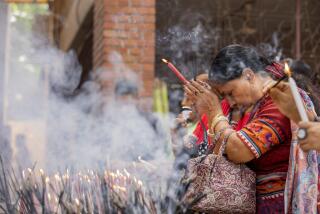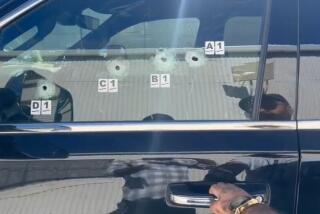Neighbors Trade Accusations of Orchestrated Violence in India
- Share via
KADI, India — People know their neighbors well in a small town, and with about 50 copies of the Koran reduced to ashes in the mosque here, Muslims have a good idea who committed the sacrilege.
Khadim Kasam Babu, who protects the tomb of a Muslim saint just outside Kadi, says Ramesh Patel, a Hindu town councilor, was the leader of a mob that desecrated that site in a separate attack Friday.
Abbas Pathan, a criminal lawyer and a Muslim community leader, blames Patel and other supporters of the right-wing Vishwa Hindu Parishad party for a string of arson incidents in western India since mob violence erupted last week.
Patel and the party deny they had anything to do with any of these attacks. But Girish Patel, a Harvard law graduate and one of India’s leading human rights lawyers, has no doubt that the VHP orchestrated murderous violence across Gujarat state--with the complicity of government officials.
“From various sources, I know there were instructions not to take any action,” lawyer Patel said in an interview Sunday in Ahmadabad, the state’s commercial capital. “If you go to any place where people were killed, or properties were looted, the police were nearby and no action was taken.”
Patel, himself a Hindu and a practicing attorney and law professor for about 40 years, has taken refuge in a friend’s home after receiving repeated threats for speaking out against the unrest.
“I receive threats every other day,” he said. “They say, ‘You are a Muslim.’ Many people tell me, ‘Why don’t you go to Pakistan?’ I might, but I would end up in jail because I would still defend the common people.”
Gujarat’s government claimed Sunday that police and army troops had brought the violence under control, although there were reports of sporadic incidents. Even as India’s hard-line home affairs minister, Lal Krishna Advani, visited Ahmadabad to show the federal government’s resolve, arsonists set fire to a mosque in the city.
Rampaging mobs have killed more than 500 people since Wednesday, when Muslims set fire to a train carrying Hindu nationalists. That attack killed 58 people, 14 of them children, and sparked India’s worst communal violence in a decade.
Survivors have said a mob of more than 1,000 Muslims carried out an organized, unprovoked assault soon after the express train left the station in the city of Godhra.
Conflicting Reports on Train Attack’s Origin
But several reports quoting witnesses have said the Hindu activists stirred up trouble by chanting offensive slogans and refusing to pay for food bought from Muslim women.
Just hours after the Godhra massacre, Indian Prime Minister Atal Behari Vajpayee said, based on preliminary reports, that “it appears that the train was stopped, maybe because slogans were being shouted in the train.”
Many of the train fire’s victims were VHP supporters returning from the northern Indian city of Ayodhya, where the party is threatening to defy a court order and start building a Hindu temple.
They want to construct it on the site of the historic Babri Masjid mosque, which Hindu extremists demolished in December 1992, setting off a wave of communal riots across India that killed between 2,000 and 3,000 people.
Narendra Modi, chief minister of Gujarat state, belongs to Vajpayee’s Bharatiya Janata Party but also has ties to the Hindu extremist group Rashtriya Swayamsevak Sangh. That party has frequently been accused of fomenting communal violence since its founding in 1925.
Kadi, a town about 25 miles northwest of Ahmadabad, escaped the brunt of last week’s unrest. Hindu vigilantes at a roadblock outside town set two Muslim truck drivers on fire, but they survived the attack, said Pathan, the Muslim community leader. Looters also struck every Muslim-owned shop, he said.
Although the town’s streets were deserted Sunday, and the minority Muslim community still frightened, the worst appeared to be over. When the violence peaked in Kadi on Friday, a Hindu mob set fire to another Muslim saint’s tomb, destroying a site that had survived untouched for roughly two centuries, Pathan said.
Pathan accused Babu Bhai Kachwala, the VHP’s local leader, of driving around town and nearby villages in a party vehicle, rallying Hindus against Muslims through a loudspeaker mounted on the roof.
“I have seen him do it every day,” Pathan said. “He says things like: ‘In Hindustan [India], if Hindus and Muslims are supposed to live together, then they must all be our followers.’ ”
Kachwala denied doing anything but provide free medical help to the poor, Hindus and Muslims alike, in his party jeep.
“We only serve,” said Kachwala, who also denied having anything to do with attacks on Muslims or their holy sites.
“Sometimes it happens that they burn their mosques themselves and they blame it on others,” said Vishnu Bhai Patel, a VHP party member sitting at his leader’s side.
For his part, Ramesh Patel, the town councilor, rejected the accusation that he led a mob of about 800 Hindus in the first of three attacks last week on the Muslim saint’s tomb outside town. Patel wasn’t at home Sunday afternoon, but after returning about 9 p.m., he insisted that he had been a force for peace.
“I don’t go anywhere at all,” he said in a telephone interview. “I just stay in my area trying to keep everyone quiet. I do not provoke anyone.”
Ashes of Koran Lie on Imam’s Seat
Kadi’s small 19th century Bhagdalwad mosque was destroyed during anti-Muslim riots in 1969 and was rebuilt. Now, the inside walls have been scorched by the flames of burning prayer mats and copies of the Koran.
The ashes from several of the burned holy books were lying Sunday on the marble minbar, the stepped seat where the imam leads prayers every Friday.
In Ahmadabad, looting and arson attacks on Muslims were so systematic last week that they must have been organized, said Patel, the human rights lawyer.
“They carefully selected Muslims’ property and destroyed it,” he said.
Among evidence of that, Patel said, was the fact that arsonists and looters somehow knew that such buildings as a local hotel, part of a U.S. chain, and a single shop in an upscale mall were owned by Muslims. He doubted that spontaneous attacks would have been so precisely targeted.
An old Muslim friend of Patel’s, he said, called him in a panic just after midnight Wednesday, the worst day of rioting in Ahmadabad, to ask for help because a Hindu crowd was besieging his home.
Patel said he made several phone calls, desperately trying to persuade the police to rescue his friend and his family, and after getting nowhere, phoned Police Commissioner P. C. Pande.
“He’s a good man, one of the rare ones you find without corruption,” the lawyer said. “He said, ‘I’m helpless because the police are highly communalized.’ ”
Eventually, a single police officer fired tear gas to disperse the mob outside the home of Patel’s friend, the lawyer said. The crowd regrouped but didn’t kill the man, who escaped the next day.
Ahsan Jaffrey, a former member of Parliament, wasn’t so fortunate. He died that night with 19 relatives in the flames of his own house. He had tried to chase the crowd off by firing his rifle into the air.
*
Sidhartha Barua of The Times’ New Delhi Bureau contributed to this report.
More to Read
Sign up for Essential California
The most important California stories and recommendations in your inbox every morning.
You may occasionally receive promotional content from the Los Angeles Times.













